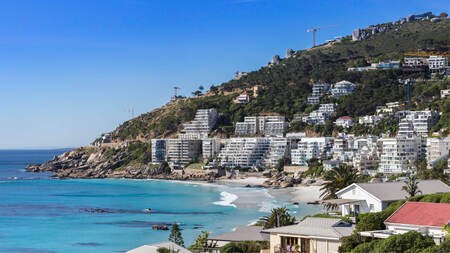|
Property specialist Ian MacDonald from Platinum Planet had this to say about fractional ownership. “The economy is fragile at the moment and so it’s very difficult for young people especially to get a foothold in the market. Fractional ownership is fast becoming one of the ways to do just that. Fractional ownership means lower deposits and lower purchases prices”. But fractional ownership is definitely not only for first-time buyers. "For investors, fractionalisation means a wider variety of property ownership at a 1/13th of the price. Rental income from the property also ensures that investors and all fraction owners have a return on their investments.” MacDonald believes that “spreading the load” makes sense in these times. “Why carry the cost of the whole house year-in and year-out when you are only getting to use it one month of the year. It just makes financial sense.” So what’s the difference between this and timeshare? MacDonald says: “Essentially it’s ownership that’s the big difference. With timeshare you only own the time, but with fractional ownership you own 1/13th of the property as well.” Allen West disagrees. West lectures at the Justice College, the University of Pretoria and for the Law Society. He’s also the author of The Practitioner’s Guide to Conveyancing and Notarial Practice. In his opinion, fractional ownership is timeshare: “nothing more, nothing less”. “It’s my personal view; I wouldn’t recommend it as a way of buying property because when you go this route, you do so without legal protection.” He explains: “The person buying fractional ownership gets an undivided share in the land, which is registered in his name in the respective Deeds Registry. However, the legislation governing timeshare doesn’t govern fractional ownership.” In terms of “exit options”, West says it’s easy to get rid of fractionally owned property in a good market when the wealthy are buying. “But in a climate such as this, people are not going to go this route unless they have cash on hand.” The other downside is that the banks won’t provide mortgage finance for property in fractional ownership schemes. You must buy cash, says West. West has heard many a horror story, but finding people who are willing to share their stories isn’t easy. Given that they are the more affluent buyers, West suggests that pride may be a factor. It’s about being able to afford the initial outlay and the maintenance costs. Fans of fractional ownership argue that it makes the property market more accessible, but West argues that it inflates prices. He gives the example of a flat with a market value of R800 000. When the property gets carved up into eight equal portions, instead of selling them off at R100 000 apiece, they go for R200 000 apiece, inflating the price substantially. MacDonald encourages those considering fractional ownership to be wise. “As with any property purchase, make sure you investigate all the options. If you’re going through an agent check that they are members of the SAAFI. This is the South African Association of Fractional Intermediaries and they exist to protect the interests of the fractional client.” He shared some tips on the main things to look for when considering fractional ownership. “Make sure you consider location, facilities, accessibility, quality of the building, price, value for money, return on investment, levies, rates, taxes, climate and local attractions for tourists especially.” Speaking of the risks involved, he cautions: “Build in some fat in case you experience fluctuation on your bond rate. Then you also need to watch out for unprofessional management of the fractions and bad build quality or maintenance of the units.” According to MacDonald, the fractional ownership hot spots in SA are the coastal areas like the KwaZulu-Natal north and south coast, the Garden Route from Jeffrey’s Bay to Mossel Bay and Cape Town. “The Natal Midlands, the Drakensberg and the Bushveld, especially north of Pretoria in the Bela Bela region are exciting in terms of fractional ownership too. I believe this is linked to tourism and the international popularity of these areas.” Jo’burg based businessman Ian Dornan has been in the property market for the past eight years. For seven of these years he’s owned fractional property. At the moment he owns a handful of properties that he is selling off in fractions. “I have a lovely spot called The Lake House situated between Hazy View and White River on the R40 road from Nelspruit. I have another home on the Degama Lake in the Hulala Hotel Estate. The Lodge, Colonial and Engedi House are situated in Marloth Park overlooking the Kruger Park. At the moment I am selling ten fractions on each property.” Dornan says that the management of these properties is pretty hassle free too. “Engedi Park Rentals manages the levies from each share holder and then dispenses the funds to cover the monthly running costs, administrate the cleaning and management staff on site, execute all maintenance and service issues and all logistics associated with the homes.” For Ian, the risks are minimal. “The cost simply comes down to your outlay for the fraction (generally most people will pay cash or draw it from their bond) and a nominal monthly fee for the annual levies per fraction that you own. I anticipate that my share or fraction will grow at a minim of 10% a year and if I need to, I can sell my share with the opportunity to receive a good rental income (covering my levies). So the risk is low and I have a great holiday home to take my family to." So rather than taking transfer of undivided shares in the property individually, shareholders arrange for a company, close corporation or the trustees of a trust to take transfer of the whole property. When a shareholder wants to realise his/her investment, they sell their shares, member’s interest or beneficial rights to a new participant and the property remained fully vested in the “holding entity”. “First this will drive down the legal and revenue costs associated with trades of participants’ interests. Secondly it will ensure that new entrants are bound by the sharing and contribution arrangements which can be set out in detail in the founding statement, articles of association or trust deed.” Paddock said a difficulty in an arrangement where each of the participants takes registered ownership of a share is that banks only lend money if they can get all the shares in the property mortgaged to secure the debt. So it is not practically possible for individual participants to make separate mortgage finance arrangements. |
Property Advice
 During economic times such as these, breaking into the property market is tough. Alternative ways of buying property, such as fractional ownership, are attracting many would-be investors who can’t afford to go the conventional way.
During economic times such as these, breaking into the property market is tough. Alternative ways of buying property, such as fractional ownership, are attracting many would-be investors who can’t afford to go the conventional way. 


